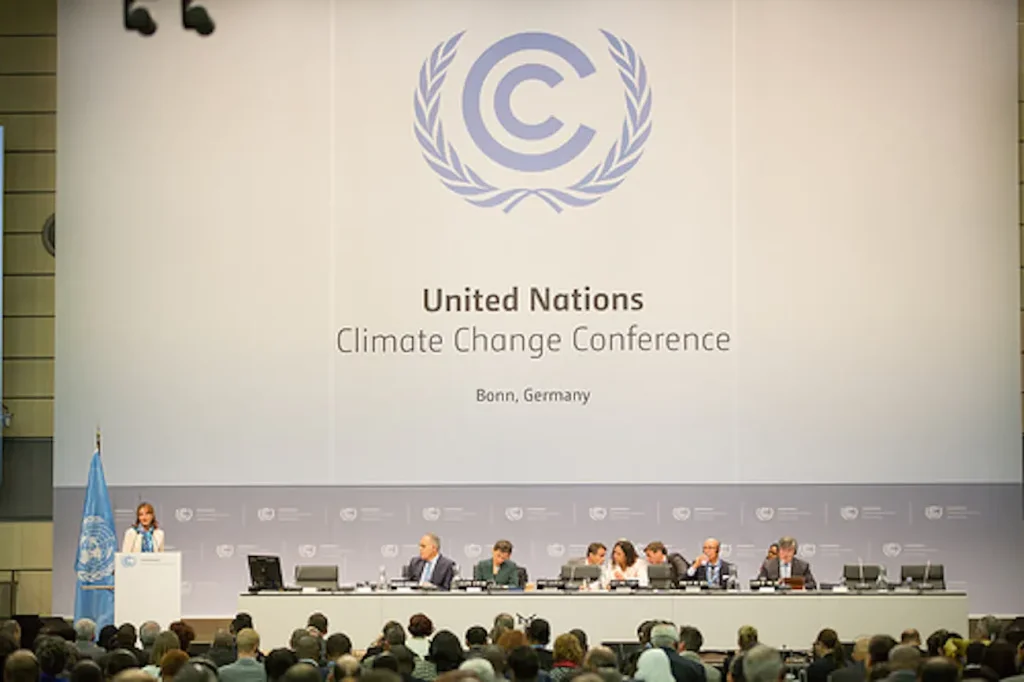Key takeaways:
Direct air capture (DAC) is a negative emission technology that can help to achieve the climate targets agreed on in Paris
Climeworks produces DAC modules to be used in its first industrial-scale DAC plant
At the UN Climate Change Conference (Bonn, May 16th to 26th), Climeworks informs about the need for negative emission technologies and its DAC technology at a trade show booth

UN Climate Change Conference: Climeworks informs about negative emission technologies
To achieve climate targets, e.g., reducing global warming to 1.5°C, CO₂ might have to be extracted from the atmosphere on a gigaton scale. There are only a few negative emission technologies with the potential to capture and store the necessary amounts of CO₂ until 2100: In combination with storage technology, Climeworks’ direct air capture technology (DAC) is one of these. The implementation of the COP21 Paris agreement will be discussed at the Bonn UNFCCC Climate Change Conference (May 16th to 26th) – the Swiss cleantech startup Climeworks will be able to inform the members of the conference about the need for negative emission technologies and its DAC technology at a trade show booth
How it works
The Climeworks CO₂ direct air capture technology is based on a cyclic capture-regeneration process and a novel filter. During the capture process, atmospheric CO₂ is chemically bound to the surface of the filter. Once the filter is saturated, the CO₂ is released by heating it to a temperature of about 100 degrees Celsius, thereby delivering high-purity gaseous CO₂. The CO₂-free filter can be reused for thousands of capture-regeneration cycles. DAC is a negative emission technology when combined with a permanent carbon storage solution. Currently, Climeworks is producing 18 DAC modules to establish the world’s first industrial-scale DAC plant in Hinwil, Switzerland. By the end of this year’s third quarter, it will begin operation and capture a yearly amount of 900 tons of CO₂ from the atmosphere for enhancing the growth of vegetables in a nearby greenhouse. Like all Climeworks’ DAC plants, the Hinwil facility mainly relies on low-temperature thermal energy (1500-2000 kWh/t CO₂), which can be won from industrial processes or solar thermal power plants. This plant will showcase Climeworks’ DAC technology on an industrial scale and prove its suitability as an important part of a negative emission solution.
Simply by changing the number of modules, Climeworks’ DAC technology can be freely scaled to meet the demands of any application and therefore has the carbon removal potential to limit global warming to 1,5 degrees Celsius. Some advantages compared to other negative emission technology options are fully-flexible placement independent of emission sources (e.g., deserts), and the small area that is required to install the necessary DAC modules. DAC consequently does not interfere with any biological system or food production.
About Climeworks
Climeworks AG was founded at the end of 2009 and has since then developed its proprietary direct air capture (DAC) technology from laboratory to industrial scale. In late 2014, Climeworks announced the commissioning of an industrial-scale CO₂ capture unit – called ‘CO₂ Collector’ – with a capacity of capturing 50 tons of CO₂ per year. Since then, the CO₂ Collector has proven to operate successfully, thus standing for the final developmental step of Climeworks’ technology. Commercial plants will be built from units of the same size in a modular way to meet the customers’ individual requirements
Lead the race toward net zero
High-quality carbon removal for your climate strategy.